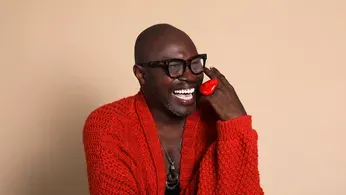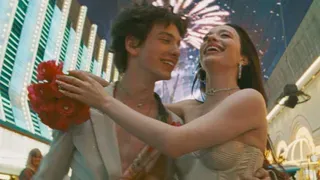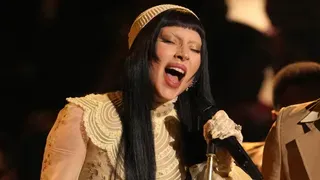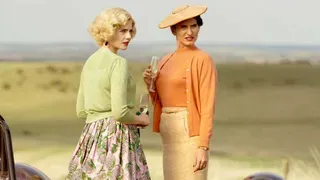
October 9, 2024
'I Can Sing That.' 'Strange Loop' Alum James Jackson, Jr. Connects with Favorite Songs for Ptown Cabaret
Robert Nesti READ TIME: 8 MIN.
When James Jackson, Jr. headed to New York after college for auditions to Broadway shows, he heard a familiar meme. "I didn't know how to audition," he explained this past August via phone. "So I would go in and sing something like 'Bring Him Home' from 'Les Miz.' And I was immediately told, 'Oh, you can't sing that.'"
This sort of reaction was nothing new for Jackson. "When I was at college and studying opera – I talk about this in my show – I wanted to sing 'Dalla sua pace' from 'Don Giovanni.' This gorgeous tenor aria I worked so hard on. And I was told, 'You don't need to learn that because you're not going to singing in Don Giovanni.'"
Or he was addressed in coded messages. "I was asked by someone at an audition, 'Do you have anything more urban?' And someone else asked, 'I like what you did, but can sing more like Billy Porter?'"
It was, coincidently, the same response that his friend and collaborator Michael R. Jackson (no relation) was hearing when he was pitching his musical "A Strange Loop" during its long 15-year journey to its first professional production. "I remember no one thought Michael's songs could play on Broadway," James said in an interview earlier this summer. "They're too gay. They're too Black. They're too all of that."
But the songs connected with James, who joined Michael on his journey and stayed with the show for 13 and a half years, if only because the show spoke so personally to the experience of being a Black, queer man in America. "It spoke to a lot of things at the core of just who I am as a person, who Michael is as a person. But we also found a commonality and a friendship."

"A Strange Loop" follows the inner turmoil of an aspiring musical theater writer who supports himself ushering at Broadway's "The Lion King." Usher, as he calls himself, wants to focus on putting onto the stage what it is like to "travel the world in a fat, Black, queer body," but his Thoughts (played by six actors) continuously sabotage him. James played the most self-destructive of all: Self-loathing. "I played a bitch in the show," he recalled. "I was the deal. I was self loathing, so I was not nice to people. So James made it a point to, I have to go out front after every show to meet people. I had to let them know that I'm not a bitch. I just play one on stage, I swear to God."
Asked what he will be performing this Friday and Saturday at Provincetown's Post Office Cafe and Cabaret, James says, "Material-wise, it is more of a traditional cabaret. There will be a few songs I did in my Juneteenth show, Ray Charles' 'Hallelujah I Love Her So' being one of them. The highlight for me this go around is that I'm bringing my trusted piano player and music director, Elliot Roth, who I've worked with for the past 13 years. He'll also be handling arrangements for the album we are working on later this year."
"Even before 'A Strange Loop,' I have connecting to the music that I have always been told I cannot sing. I'm not supposed to do that. And much of this music was the music I grew up with. My mother had great taste in music. So, I can go from a Nina Simone song into a Tori Amos song, I sing opera in my shows. I sing what speaks to me, and people afterwards are surprised, like, 'Oh, I've never heard Pat Benatar song like that.' Or, 'I didn't know that you can connect Pat Benatar and Ray Charles.' Like, yeah, you can."
So don't be surprised to hear songs by Tori Amos, Nina Simone, Pat Benatar, Ray Charles, and Stephen Sondheim. They also are his reaction to being told he couldn't sing some songs. "My song choices speaks a lot to me having been told you can't do something. It's just not me being bratty and saying, 'Well, I'll show you.' Instead, it is me just saying, 'I can. Just listen.' And folks seem to be impressed or moved by it, and I think it's a really beautiful exchange."
For the longest time, James steered clear of Broadway material in his cabaret act. "I was terrified to go into that world," James confides. But during "A Strange Loop," that evolved – including one Sondheim song he was told he "was not to sing": "A Glamorous Life" from "A Little Night Music." Not the stage version; the one written for the ill-fated musical version in 1978 that has been made famous by Audra McDonald in concerts. "It is my favorite Stephen Sondheim song – the most beautiful song he has ever written." In the song, a teenage girl sings of her mother's far-less-than-glamorous life as a stage actress. James said he thought of the song a few summers before while teaching young theater students in Provincetown about Tennessee Williams. "And I found these Tennessee Williams quotes and interviews and things about him and his own mother's relationship. And I thought of this song, and I figured out how to do it. The response has been great across the board. I had one gay man say to me, 'I am going to hell for saying this, but I never want to hear Audra sing it again.' I don't think they've ever heard the song sung from the point of view of a man."
While "A Strange Loop" was playing on Broadway, James tweeted once that the role he wanted to play was the Baker's Wife in another Sondheim show, "Into the Woods." "Whatever I said, pissed people off," he recalls. "I got these angry tweets, and I thought, 'Oh my God. I've arrived!' That they were so offended by a make-believe tweet is funny to me." But it also gave James the resolve to sing the Baker's Wife endearing solo, "Moments in the Woods," but from his point of view. "I tell that story. And I tell a story of me meeting Bernadette Peters backstage at the Tonys, and her answering me in a tweet wanting me to sing this song. And people have said, 'Wow, I just I never heard it put that way.'"
James grew up in Randolph, a suburb of Boston, and recalls going to Provincetown all his life. "I remember as teenager, if one of my friends could drive and had a car, we'd head there. And we really didn't know why. But in hindsight, I think it was this big gay magnet that was pulling us there." But when James moved to New York, he found many of Black friends were not fans of the popular gay resort. "I have these friends in New York, these other artists of color, just performers and writers of color who don't understand why I travel to Provincetown so often. They always say that Provincetown just isn't for them. It's not for us. And that makes me so angry. I get, like, enraged by it, because that's never been my story. I've always felt so welcome there, and part of my own history is feeling part of that town."
Such was the genesis of his "A Juneteenth Cabaret," which he presented at the Gifford House's performance space The Wilde this past June, in which he looked back at the many Black performers who played Provincetown over the years. "I keep getting back to the amazing summer of 1955 where, over a four week period, Eartha Kitt, Ella Fitzgerald, and Billie Holiday all happened to play the A House. And I was like, 'What? How is this? How do I never know this?'" He added that many of singers' band members were not allowed to stay in town, so the families of the Portuguese fishermen took them in. "What they did speaks of Provincetown as a caring community that takes care of others."
He also learned in his research for the show that Kitt fell in love with the town and recorded a live album at Town Hall in 1988 or 1989. Also, that Nina Simone played there a number of times. And then there was Grace Jones, whose visit to Provincetown is famous for when she visited the Boatslip for T-Dance and lost an earring on the dance floor. She made the DJ stop the music so her entourage (along with everyone on the dance floor) could search for it. They didn't find it, and believe it fell beneath the deck, amongst the piling of the deck – which, coincidently, is the location of the Dick Dock, a well-known after-hours cruising area. "The lore around Grace Jones is that after no one found her earring, someone built a shrine at the Dick Dock commemorating that was the spot where Grace Jones had lost it. The shrine stayed there a couple of weeks. I don't know if it is true or not, but I think it a hysterical example of how lore can spread."
What James has always loved about Provincetown is its freedom. "It is a place where people are free to do whatever. And I think that's excellent to have a place anywhere on this planet that you could do that."
What he loves about performing is gazing out at an audience. "I have the best view in the world, whether it's on Broadway or at a small cabaret space in New York, or Boston, or in Provincetown. I get to watch people receive something. There is no greater joy in the world. And I kind of, I wish it on everyone. It is such a really cool thing. So if I am just getting up there to sing things, and under the guise of, 'Hey, I was told one time I shouldn't sing this.' So, here it is, and then you enjoyed it. Then I did my job. I did my job."
Watch James Jackson, Jr. perform "We Belong" by Pat Benatar.
Watch James Jackson, Jr. sing "Soon As I Get Home/Home" from "The Wiz"
Robert Nesti can be reached at rnesti@edgemedianetwork.com.







